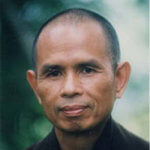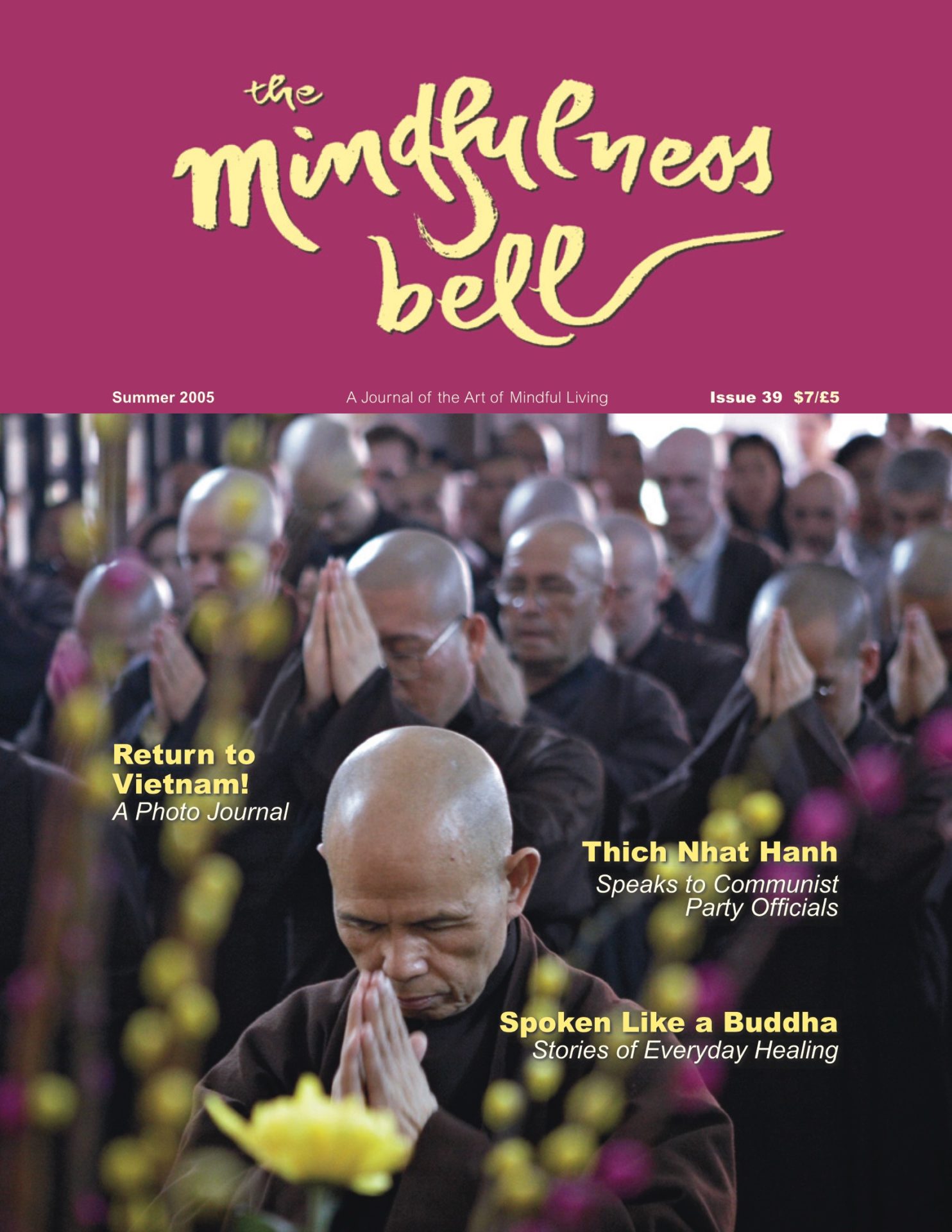Thich Nhat Hanh Speaks to Communist Party Officials at the Ho Chi Minh Political Institute, Hanoi March 17 and 18, 2005
By Thich Nhat Hanh in June 2005
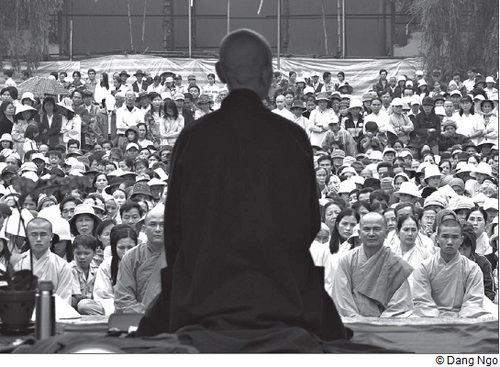
Buddhism can help us see the truth, reestablish communication, and bring happiness to ourselves and our families. The religious element of Buddhism is hope, faith, and prayer. But Buddhism is not just a religion.
Thich Nhat Hanh Speaks to Communist Party Officials at the Ho Chi Minh Political Institute, Hanoi March 17 and 18, 2005
By Thich Nhat Hanh in June 2005

Buddhism can help us see the truth, reestablish communication, and bring happiness to ourselves and our families. The religious element of Buddhism is hope, faith, and prayer. But Buddhism is not just a religion. Buddhism has insight and concrete methods to help us resolve our difficulties, calm our emotions, transform our suffering, reestablish communication with others, and bring happiness. Methods like breathing mindfully and walking mindfully produce the energy of mindfulness. With that energy we recognize the pain that is coming up in us, and embrace it and calm it down. With mindfulness, we can look deeply and see the roots of our suffering. We are able to shine the light of understanding and transform our suffering.
In us we have anger, sadness, anxiety, and we also have love and understanding. We are like an organic garden. When flowers die they become compost, and from that compost, beautiful new flowers grow. Our suffering is our compost—our sadness, our grief, our despair, our jealousy, our discrimination. But we also have flowers—understanding, love, forgiveness, self-sacrifice— and both things are organic.
Buddhism teaches that the afflictions are the awakening. Awakening means happiness. We use the rubbish to make compost and then to grow flowers. If we know how to embrace and transform, we can turn anger into happiness and wisdom. This is called the insight of non-duality. Afflictions can become awakening. And awakening, if we do not look after it properly, will become afflictions. If we are not afraid of the rubbish, we will know how to turn it into flowers.
Hungry Ghosts
When children cannot trust their parents, then they cannot trust their ancestors, and that is why each day our society creates thousands of hungry ghosts. These hungry ghosts feel lonely and alienated. They have suffered because of their family, school, church, temple, and society, so they deny the basic structures of society.
There are a lot of hungry ghosts both in the West and in the East. What are they hungry for? They are hungry for understanding; they feel no one understands them. They are hungry for love; they feel no one can love them. But even if we offer them love and understanding, they cannot receive it, because they have great doubt and great suspicion. So in order to help them, we have to be very patient. Hungry ghosts are not spirits in the clouds, they are people of flesh and bone around us. We have helped many hungry ghosts to return to their home and their tradition.
In Touch with My Father
One day I talked to my father and said, “Father, the two of us have succeeded.” I was successful because in that moment of sitting meditation, I felt completely free. I didn’t have any more dreams or wishes, any more projects I wanted to pursue. I felt completely free, completely relaxed; there was nothing that could pull me anymore.
When I talked with my father, I knew that he is not separate from me. Please understand that if someone who prays does not yet have the wisdom to know that the object of prayer and the subject of prayer are one, that person still has a good chance of deepening their understanding in the future. And what they are doing is valuable because communicating with their ancestors keeps them from feeling rootless.
How to Connect with Our Ancestors
Based on the treasury of Buddhist literature, in Plum Village we have developed practices that can help people to reestablish their connection with their ancestors. The practices of the Five Touchings of the Earth and the Three Touchings of the Earth have helped Westerners to heal a lot of their loneliness and agitation. Imagine five thousand Westerners touching the earth, guided to understand that all the characteristics of their ancestors are circulating in their body. When they stand up, they are different people, because they have let go of their despair, their hatred, and their anger. I would like to suggest that you look further into these practices.
We have also written a prayer for the New Year, vowing to our blood and spiritual ancestors to love, forgive, and accept each other in the coming year. If every Vietnamese family would maintain an ancestral altar, and each day take one minute to come together and light a stick of incense in silence, that moment would be enough to help us not fall into alienation. We are the trees that have their roots, we are the river that has its source, and we carry our ancestors into the future. Anyone can do this, including a businessman or a politician. In the West people have begun to do this.
Our parents have transmitted to us their whole self, according to genetic science. We cannot remove our parents and ancestors from us, because every cell contains in completion all the previous generations of ancestors. You cannot take your father or your mother out of yourself, because you are your father, you are your mother. If you are angry with your father or your mother, you are angry with yourself. If you are angry with your children, you are angry with yourself. Our children are our continuation and they are taking us into the future. If we want to be beautifully continued, we have to do the most beautiful things that our life can produce.
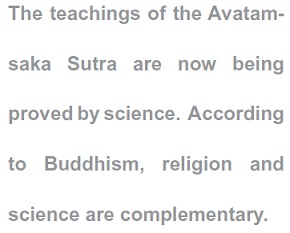
When a father is not happy, he will make his whole family suffer. If the children can look deeply, they will see that their father is the victim of his own suffering. Maybe when he was a child, he was not cared for, so he was wounded. When he was growing up he had no teacher to help him transform his suffering. He passed on all his suffering to his children, so they are angry with their father, and blame him. They are determined that they will not be like him, but if they do not practice, they will be just like him, because they are his continuation. Therefore, the intervention in our life of the spiritual and moral dimension is absolutely essential.
We all have received transmission from both our blood family and our spiritual family. Our teacher is our spiritual father; he gives birth to our spiritual life and transmits the whole of himself to his disciples. If we do not have a spiritual lineage transmitted to us, we have no means to recognize our suffering, or ways to transform it. We will pass on our suffering to our children, and that is a great shame. Only by having a spiritual life can we become a free person, free from our suffering.
A Question of Superstition
Question: Worshipping the ancestors is very good for our country. But when people make an offering and then make a prayer asking for something, it’s a kind of exchange: if I make an offering, then you will give me something. That is superstition.
Thay: The key to this very important question is education. The superstition of today can become the non-superstition of tomorrow. When we go to the temple, we light the incense and bow before the statue of Buddha. It may look like superstition, but Buddhist insight tells us that Buddha is the capability of understanding, of compassion, of love. Of course that statue is just a representation, a symbol. When people start practicing, they think that Buddha is outside of them. But when they become good practitioners, they see that they have Buddha nature within them, and they see it in others. We have to help people go to a higher level of understanding. We also have to see the cultural value in this practice and that our love for the deceased is our motivation.
Lighting Incense on the Ancestral Altar
We accept that the tree has its roots and the water has its source. The ancestral altar shows us that the value of our life comes from its source. Every day you light a stick of incense at your ancestral altar. While we are lighting the incense, we can be in touch with the ancestors in each cell of our body. My teacher taught me to put the energy of mindfulness, concentration, and insight into lighting the incense. When your body and mind are together fully in the moment, that is the energy of mindfulness. And when you are completely attentive to what you are doing, that is the energy of concentration. Then there will be communication between you and your ancestors in every cell in your body. Saluting the flag is not superstitious, because you know that the flag is a symbol for your country. If you say lighting incense is superstition, then you are also saying that the flag is superstition.
Our ancestors have the right to know what’s going on in our lives. When we have child who is sick, we can light a stick of incense and ask the ancestors to help the child. We say, “Oh, the child is so sick, I ask the ancestors to protect the child,” and wake up the presence of our ancestors in each of our cells and in the cells of our child. If we listen deeply, we will hear a response from the ancestors in each of our cells.
Cloning
Whatever has insight and understanding is scientific; whatever doesn’t is superstition. In cloning, you take a cell from one body and you make another body. We can take any cell, starve it for two or three days, and it will become a germ cell. Then you can remove the contents of an ovum from a woman, put it with the germ cell and insert it in the womb of a woman. After nine months the child born will be the exact replica of the cell donor. That is called cloning. This works because every cell of our body contains all the other cells. The teachings of the Avatamsaka Sutra are now being proved by science. According to Buddhism, religion and science are complementary.
King Tran Thai Tong
When King Tran Thai Tong was twenty years old, his uncle declared that his nineteen-year-old queen was too old to give birth. The uncle wanted a successor to the king, so he forced Tran Thai Tong to divorce his wife and marry his wife’s pregnant elder sister, who was already married to Tran Thai Tong’s brother. The king was forced to abandon his beloved wife, so he decided to abdicate, and he went to Yen Tu Mountain. What suffering for a twenty-year-old man to go through! His elder brother also suffered a lot from losing his wife, so he tried to organize opposition to the regime. This could have created a lot of conflict within the family. But when King Tran Thai Tong went to Yen Tu Mountain, he met the National Teacher living there, who showed him how to overcome his suffering. The teacher taught the king to be a politician and a practitioner at the same time.
The king went back and continued his duties, and he also practiced sitting meditation and beginning anew six times a day. Thanks to his moral virtue he was able to be persuasive with the kings of adjacent countries who wanted to invade. He became a very important king, the first king of the Tran dynasty.
When King Tran Thai Tong’s older brother was dying, he asked his three children to take revenge against the king, but the compassionate king dissuaded them. The eldest child was Tue Trung Thuong Si, a layman who became a great Zen master. His younger brother Tran Hung Dao was important in driving the Mongol invaders out of the country. Their younger sister married the second Tran king. King Tran Thai Tong’s practice of Buddhism transformed his family, and they all cooperated to build the country. If King Tran Thai Tong had not had a teacher to help him develop a spiritual and moral dimension, he would never have become a great politician. On both the material side and the spiritual side, we have to take root in a lineage.
Deep Listening and Loving Speech
In the past forty years Thay has taught many young people and intellectuals in America and Europe to understand that we are the continuation of our father and mother. Once children understand that, they can forgive their parents and transform their suffering, and then go back and help their parents to do the same.
Listening deeply and loving speech are wonderful practices of transformation. When the child knows how to practice loving speech and deep listening, he will say, “Father, I know that in the past few years, you’ve been suffering a great deal. I’m sorry that I haven’t helped; instead I’ve made things worse. I want you to tell me all your difficulties so I can understand you better, and then I won’t do or say things that make you suffer. It’s only because I am stupid that I made you suffer. Please help me.” When you have opened your father’s heart and he has begun to tell you his suffering then you have to practice deep listening, like the bodhisattva Avalokitesvara.
We listen with compassion, with only one aim: to give that person a chance to say everything that is in their heart so they will suffer less. Even when the other person uses words of blame and bitterness, we just listen with an open heart. These two methods are very important. Loving speech: to speak using words that express everything in our heart in a way that the other person can hear and accept. Listening deeply: to listen with the heart of compassion.
At retreats in the West, everyone learns these practices. We have helped numberless parents and children to resolve their difficulties through these concrete methods. Restoring communication and bringing happiness to our family is done through concrete, scientific methods.
Conditions for Happiness
Buddhism is a source of insight that can bring us happiness right away. When I bring my body and mind together through conscious breathing or walking, I’m able to be in touch with so many wonders of life that are in the present moment: the sky, the clouds, the birdsong, the sound of the wind in the trees. These wonders of life nourish us and make us see that life is worth living.
According to Buddhism, our basic error is believing that happiness is only possible in the future. We think, “Oh no, there’s not enough here for me to be happy. I need a couple more conditions to be happy.” And so I sacrifice the present for the future. But when we are fully in the present moment we see that we have far more conditions than we need to be happy. Sit at the foot of a tree and write down all the conditions for happiness you presently have. You will be surprised; you will need five or six pages.
When we are nourished by dwelling happily in the present moment, then we can begin to recognize the difficulties that are manifesting in our lives, and we can embrace and calm them. We have turned our community into a happy spiritual family. Each summer 2,000 or 3,000 laypeople come to practice with us, from at least forty countries. Everyone learns the methods of deep listening and loving speech to reestablish communication. Every retreat has miracles of reconciliation among couples, parents, and children.
This is What We Do
We are monastics and laypeople trained in this way of practice, offering retreats and teachings so people can transform their suffering into happiness. Each day we learn more, because we only do this one thing.
The monk or nun in the local temple has to help families reestablish communication and become happy again. The monks should practice living together harmoniously, developing brotherhood. Then they can help the families in that area to do the same thing through offering retreats and teachings. The temple should have a file on each family; the Buddhist families, the families that are not yet Buddhist, and the families that are not Buddhist at all, but who can still benefit from Buddhist practices. I believe that within six months or a year the situation in that district will change.
Without a spiritual direction, our path of modernizing the nation will fail. People fall into drug addiction, gangs, crime, or sexual misconduct because they are not happy and they don’t have good communication with their parents. They are hungry ghosts, without roots in their family or in their culture. We have to take care of the problem at the roots by helping families reestablish communication and share love and happiness. This is the work that Buddhism can do.
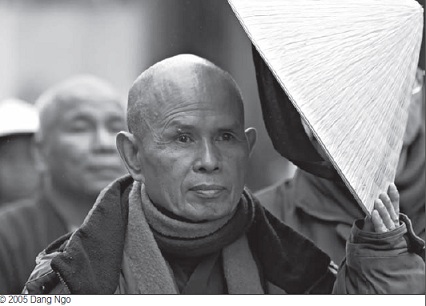
Meeting with the Buddhist community in the past two months, I see that at all levels, our learning is still too theoretical. We have to be practical, to know how to immediately apply what we learn. That is my advice to the leaders in different areas of study and training. In Plum Village our learning is very practical. If we are not able to practice reconciliation ourselves, then how can we help others do these things? We need to establish an institute where we can learn and practice at the same time, where we can train monastic and lay people who will help build beautiful, harmonious, and loving communities.
We are the Communists
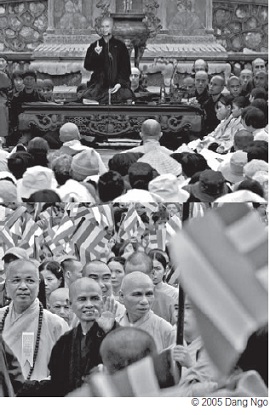
Wrong perceptions are the cause of ninety percent of our suffering; in Buddhism we call this ignorance. Ignorance in the Vietnamese language is vo minh, meaning lack of light, without the light. We all love our nation, but we suspect each other: “Does he really love the nation, the people? Or does he want to eliminate me?” These thoughts come about because we have a lot of fear and suspicion. The practice of dissipating wrong perceptions and establishing happiness and communication is not religious. When we suffer, we can go to the church or the temple to pray, but that only soothes some of our pain. If we want to heal, then we have to use concrete practices like those that Buddhism offers.
We are those who are truly without possessions, we are the true Communists. I think if you can generate brotherhood, then you will not want to eliminate each other or compete with each other anymore, and you can truly have that paradise of Communism right now. We already have it if we know how to generate brotherhood and sisterhood, and if we can understand and love each other. The practice of Buddhism is to recognize and acknowledge the presence of suffering, such as poverty, sickness, illiteracy, and lack of organization, and then to eradicate it. If our foundation is based not on individual power, but on brotherhood and sisterhood in a community, then we can overcome these four difficulties.
Corruption
Before returning to Vietnam, we heard that corruption in the Communist Party in Vietnam is severe, and that the government wants to fight this corruption. In Buddhism it is said that no animal can kill the lion, the most powerful animal. The only killer of the lion is the bacteria that reproduce themselves within the body of the lion. We can fight difficulties and obstacles outside of us, but if we let bacteria manifest within us, then we will die. That is why we agreed not to participate in corruption in order for things to go easily for us. For example, if we wanted to get our books through customs at the airport, we might need to bribe someone. We told the Vietnamese embassy in France that we didn’t want to feed the system of bribery and corruption; that we have come to Vietnam to offer our contributions, and if we use these methods, we go opposite to our intention. They agreed with us completely. During the past two months we have not practiced bribery, even though we have met many difficulties. If we engage in bribery, then we cause the bacteria within to grow and we will die. If we choose the easy way out, then we betray the people who have sacrificed their lives before us.
Engaged Buddhism
If the Communist Party supports this work, then we can change the situation in our country quickly. If a young person fails in the family, he still has a chance to succeed in school; so the teachers should learn these methods of practice too. Temple, the family, and the school need to work together to help the young people. If we can do this we can move thirty years ahead of China on this path of modernization. I have taught in several Asian countries, and I see that we have a chance. Our practice is engaged Buddhism––it takes care of the things that are actually happening in life. It’s not the Buddhism that floats in the clouds.
I know that Vo Nguyen Giap led the army in the war, and now he’s doing sitting meditation each day. I also know that Prime Minister Pham Van Dong has taken the Three Refuges. I hope that if you in the government, in the Communist Party, wish to go in a spiritual direction then you will do it. If a politician cannot communicate with his or her own family then we cannot trust that politician. Vietnamese history proves the importance of the spiritual dimension. Whether we are business or political leaders, by living a spiritual life, a moral life, we are actively, positively contributing to the fight against the problems in the society, such as corruption. We teach not with our words, but with our daily life.
In Buddhism our tradition is to live simply and know that we have enough. In the developed countries, even though they consume a lot, the suffering is great. So, if we think that happiness lies in the direction of power, of sex, of fame, of money, then we are mistaken. There are people who are going in that direction who suffer so much in their body and in their mind. It is only love that brings happiness. Without love, without time to be present for our loved ones, how can we be happy? Buddhism is only to teach people to love in such a way that we can offer happiness to each other each day.
Marxism
Question: How can we establish a dialogue between Marxists and religious people? I agree that Buddhist humanist philosophy contains a lot of deep understanding. Marx and Engels were very scientific, and I agree that the Buddha taught what are seen as modern developments in science. Now we need a dialogue between religion and Marxism. Marxists see that the nature of religion can be very destructive, but we also see the valuable aspect of religion which you have talked about today.
According to my understanding of Marxism, material strength is important, but spiritual strength is the strength of our people, so it is also very important. We have to create conditions to encourage the spiritual aspect. I hope there will be many dialogues like today, in this open spirit between the Party and the government and the religious leaders.
Thay: These are very interesting points. Thay sees that Marx had a deep spiritual dimension. Buddhists are a continuation of Buddha, and must develop the wisdom of Buddha to satisfy the needs of the people of today. And you are the continuation of Marx, so you have to keep developing what Marx taught. If that doesn’t happen, Marxism will die. That is true of all traditions, not only Buddhism and Marxism.
In Buddhism, there is the expression namarupa, name and form, that means body and mind together. Sometimes things manifest as body, sometimes as mind. It is the same thing, but it manifests in two different ways. Just like when physicists look at an elementary particle of matter, they sometimes see it manifesting as a wave and sometimes as a particle. So is it a wave or is it a particle? Now scientists are agreed that they will call it a wavicle. The same is true with material and spiritual. We could think that spirit is one thing and matter is another thing. But in fact matter does not exist outside of spirit, and spirit does not exist outside of matter.
The Heart of the Practice
Meditation is the capacity to recognize suffering, to look deeply into it, and to use the wisdom of interdependence, of non-self, and impermanence to transform it. The purpose of Zen is to generate mindfulness, concentration, and insight, so we can live deeply each moment. Mindfulness is to be aware of what’s happening in the present moment. For example, when we are aware of our in-breath, that is called mindfulness of breathing. When we are aware that we are taking a step on this planet Earth, that is mindfulness of our step. When we drink tea with our mind and body completely present, then we are drinking tea in mindfulness. When we live each moment of our life deeply in that way, that is meditation.
Concentration is present when we focus on one thing and our mind is not dispersed. With mindfulness and concentration, we can discover the insight that can transform our suffering. This insight can completely cut off the roots of ignorance and wrong perceptions.
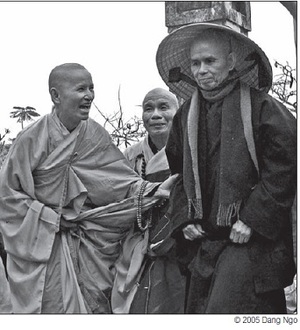
The past has gone, the future has not yet come, life is only truly available in the present moment. So we let go of regrets about the past and worries about the future, and we come back to live deeply in the present moment. Each breath, each step, each smile, each look of our eyes can help us to live deeply and bring happiness to ourselves and our loved ones. If we train like this, within just a few days we can begin to see the fruits and the joy of Zen practice.
Buddhism is inclusive, not dogmatic. In the old days Buddhism was able to live with Confucianism and Taoism, and Buddhism can now live with Marxism. Buddhism and Marxism both have to develop to respond to the people now. If we can do that, then what difficulties do we have?
The Vietnamese culture has a great capacity to transform. The word metabolize means that whatever we ingest we take in and transform so it becomes a usable part of us. We can metabolize cultures we have received from other countries, so they become Vietnamese. Buddhism has to become Vietnamese Buddhism, Confucianism has to become Vietnamese Confucianism, Taoism has to become Vietnamese Taoism, and Marxism has to become Vietnamese Marxism. Then we can hold hands and walk in harmony, in brotherhood and solidarity. We can be happy right now if we can have this inclusive attitude, this open-minded view.
Our Vietnamese Spiritual Ancestors
All the traditions that came before combined to become the Bamboo Forest tradition. When we can go together as a river, when we have brotherhood, then every person is our body. We see that each person’s suffering is our suffering. Instead of individualism, we have common views and a common direction. Bamboo Forest tradition is also engaged. Imagine King Tran Nhan Tong abdicating the throne in favor of his son, Tran Anh Tong, so he could become a monk. As a monk, he called for the building of brotherhood with foreign countries, and went to the neighboring country of Champa (now a part of Vietnam), and called for a cessation of war. When he was a king he called for peace, and when he became a monk he continued to call for peace. He was the Bamboo Forest Master.
I also want to remind you of the Zen Master Tang Hoi. His father came from Sogdia, north of India, to Vietnam as a young businessman. He loved Vietnam and he married a Vietnamese woman. Zen Master Tang Hoi lived in the beginning of the third century A.D. He was the first monk to go to China to transmit the teachings and the practice of Zen, three hundred years before Zen Master Bodhidharma. Zen Master Tang Hoi organized monks comprising the council of ordination, who went from Vietnam to witness the first monastic ordination ceremony held in China.
In the process of building a beautiful society in Vietnam, Buddhism can play a great role if we have the courage to go beyond theoretical learning, and adopt concrete practices of transformation. We can train Dharma teachers, both monastic and lay, who have the capacity to bring Buddhism into life, to help society, to reestablish communication, and to rebuild the roots of the family.
Transcribed by Terry Barber, Edited by Barbara Casey.
To request permission to reprint this article, either online or in print, contact the Mindfulness Bell at editor@mindfulnessbell.org.
